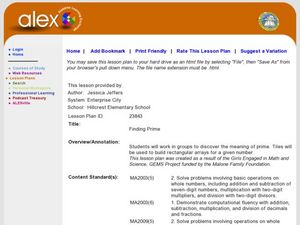CK-12 Foundation
Intercepts by Substitution: Finding a Linear Product Using a Quadratic
Discover another way to interpret multiplication. Using an interactive, learners slide points (representing the factors of multiplication) along the x-axis of the graph of y = x^2 and observe changes in the line segment connecting the...
Alabama Learning Exchange
Finding Prime
Fifth and sixth graders explore prime numbers. They work with a partner to build rectangular arrays using twelve tiles. Factor pairs are noted and recorded on graph paper. Pupils construct rectangular arrays with a prime number and...
Curated OER
Unit 2 Section 2: Prime Factors
In this prime factors worksheet, students make six factor trees. They tell the prime factorization for eight numbers. Students answer three questions regarding the prime factorization of numbers.
Math Mammoth
Factors
In this math worksheet, 3rd graders focus on determining missing factors. Students complete 34 problems representing factors of whole numbers.
Curated OER
Factors
In this factors instructional activity, students identify factors of given numbers. They identify prime numbers and name the least common multiple. This two-page instructional activity contains 24 problems. This instructional activity is...
Curated OER
Primes and Prime Factors
In this primes and prime factors worksheet, 8th graders solve 21 different problems to include identifying each number as prime, composite, or neither prime nor composite and listing all the primes less than 200. Then they complete each...
Curated OER
Factor Fun for Fifth Graders
Fifth graders explore common factors. In this factorization instructional activity, 5th graders discover the greatest common factor among two numbers in a game format. Students build on previous knowledge to determine the greatest common...
Curated OER
Find the Factors
For this factors worksheet, 3rd graders look over a factor box with numbers inside it and then choose two pairs of factors inside the box to complete 6 multiplication problems.
Curated OER
One Million: The Product of Two Numbers
In this product worksheet, learners solve 1 word problem. Students try to find two numbers whose product is one million, but neither number has zeros in it.
Curated OER
Mass Production Using an Assembly Line
Fifth graders examine the industrial revolution. In this industrialization instructional activity, 5th graders explore the concept of mass production via the assembly line. They then create an assembly line which demonstrates its costs...
Curated OER
Products, the Environment and Consumer Choices
Students review the factors of production and how they are used to make the products they buy. In groups, they participate in different scenerios in which they discover the amount of power they have to affect change buy purchasing the...
Curated OER
Common Factors and Factoring by Grouping
In this algebra worksheet, young scholars factor out common factors of polynomials. Once the common factors are out, students factor trinomial expressions into the product of two binomials when possible.
PHET
Area Model Decimals
Area works with decimals too. Pupils use the interactive to model multiplication of two decimals using an area model. They see how the decomposed components of the factors obtain partial products and then the complete product. Using area...
Federal Reserve Bank
The Output Gap: A‘Potentially’ Unreliable Measure of Economic Health?
How can we accurately estimate what the economy should produce now and in the future? Have your pupils tackle this question as they learn about real versus potential GDP and as they review data regarding the output gap in the United States.
Curated OER
Identifying Terms, Factors, and Coefficients
What are terms, factors, and coefficients? This slideshow provides definitions and examples of various parts of algebraic expressions, and provides guided practice problems in writing and identifying parts of algebraic expressions for...
Curated OER
Cuisenaire Multiplication
Cuisenaire Rods give learners an excellent strategy as they learn about multiplication. How many ways can they make the same product? Using a target product, learners lay out rods to achieve that number through various factors. This...
Curated OER
Multiplying and Dividing by 10
Once young mathematicians understand how easy it is to multiply and divide by 10, they'll be hooked! They complete four sections of 12 problems each, all involving this skill. First, scholars find the product of various whole numbers...
Curated OER
9.6 Factoring Special Polynomials
In this factoring special polynomials, students find the product of given polynomials. They factor polynomials and determine the difference of two squares. This one-page worksheet contains 40 multi-step problems.
Curated OER
Estimating Products
Multiplication on the fly becomes easy with the magic of estimating! Scholars round numbers up to four digits to complete multiplication problems without a calculator. They write in the new factors and the approximate product for the...
Curated OER
Odds and Evens
What happens when you multiply an odd number by an odd number? Scholars find out as they focus on patterns and number attributes while solving 48 multiplication problems. The first set has them multiply two odd numbers and record what...
One Hen
Making Choices
When choosing what foods to eat, there are a lot of factors to consider. To help make the decision a little easier, young learners work in small groups developing short plays, stories, or advertisements that address the different issues...
EngageNY
Fraction Multiplication and the Products of Decimals
Class members come up with a hypothesis on the number of decimal digits in the product of two decimals. Learners work in groups to complete several decimal multiplication problems. The results help groups develop a conjecture on the...
It's About Time
Oil and Gas Production
Would you consider a power failure a current event? This lesson uses multiple experiments, guided inquiry activities, and group discussions to cover the topics of oil and gas production. This is the seventh lesson in a series of eight.
DK Publishing
Finding 5 - Multiplying by 5
Visualize multiplication facts using rectangular arrays. Scholars multiply single-digit factors by five and represent each number sentence using sets of dots. They circle the groups of five and fill in missing parts of the equations....

























